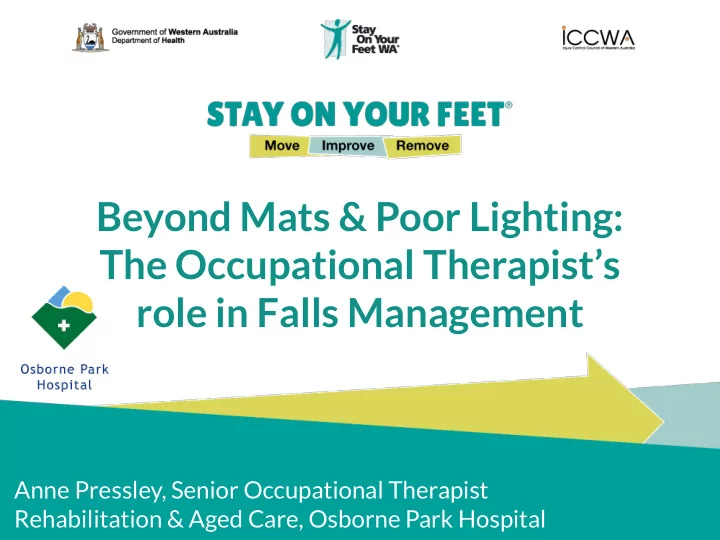

Beyond Mats & Poor Lighting: The Occupational Therapist’s role in Falls Management Anne Pressley, Senior Occupational Therapist Rehabilitation & Aged Care, Osborne Park Hospital
Falls • 1 in 3 community dwelling people over 65 fall each year. • Falls are multi-factorial. • Environment is a likely trigger. • Behaviour, cognition, culture & experience shape client attitudes.
Occupational Therapists, Environment and Falls • An occupational therapy home visit, as part of a multifactorial strategy, is strongly recommended based on high quality evidence (NHMRC level A) when considering hazard reduction, training and education. • Patients who will particularly benefit are those who are at high risk such as those with vision impairment and recent hospitalisation. Waldron, N., Hill, A. & Barker, A. (2012)
What Skills Does the OT Offer in the Home Environment? • Specialist assessment of function in unique environmental contexts. • Knowledge of the functional impact of a range of medical conditions & disabilities. • Specialist skills in activity analysis, task gradation and adaption. • Knowledge of cognitive and perceptual issues relating to function. • Skills in applying goal setting, self management and behaviour change strategies. • Extensive knowledge in a range of environmental modifications, functional strategies and creative solutions to address limitations and hazards.
Specialist Assessment of Function in Unique Environmental Contexts • Detailed observation of a client’s performance of functional activities and transfers within their home and community. • Consider function over 24 hours. • Consider culture and values. • Determine range of risk factors. • No ‘one size fits all’ approach. • Consider resources already in place.
Knowledge of the Functional Impact of a Range of Medical Conditions & Disabilities • Stroke • Diabetes • Parkinson’s Disease • Arthritis • Dementia
Specialist Skills in Activity Analysis, Task Gradation and Adaption • Tap into usual methods where possible. • Consider task demand and cognitive load. • Dual tasking is important. • New , safer methods rather than ‘undoing’ ineffective habits. • Rehabilitation versus Compensation. • Least intrusive interventions.
Knowledge of Cognitive and Perceptual Issues Relating to Function at Home • Planning, awareness, attention, memory and orientation. • Visuospatial skills • Anxiety & depression
Fear of Falling Cycle Acknowledgement: Falls Specialist Service, SCGH
Goal Setting, Self Management and Behaviour Change Strategies • Set goals. • Ownership of the environmental and functional strategies. • Sense of self efficacy. • Education. • Intervention takes time to have an effect. Pick the three most important factors and tailor.
Behaviour Change Prochaska & DiClemente, 1983
In Summary • Physical changes to the home environment are only one aspect of the Occupational Therapist’s role. • Analysis of functional activities give a unique understanding of the client’s behaviour and values. • Client must be receptive to change for any falls intervention to be effective in their home. • Some risk is beneficial. • Don’t underestimate fear of falling.
Environmental Modifications / Functional Strategies Before After
Falls Sensors / Alarms
Monitoring • Infrared, sound modalities. • Baseline data on usual routines & activities is used to determine unusual changes which may be indicative of a fall. • Privacy issues. http://www.abc.net.au/news/2016-03-07/sensors-help-carers-to- monitor-seniors-from-afar/7227718
Recommend
More recommend